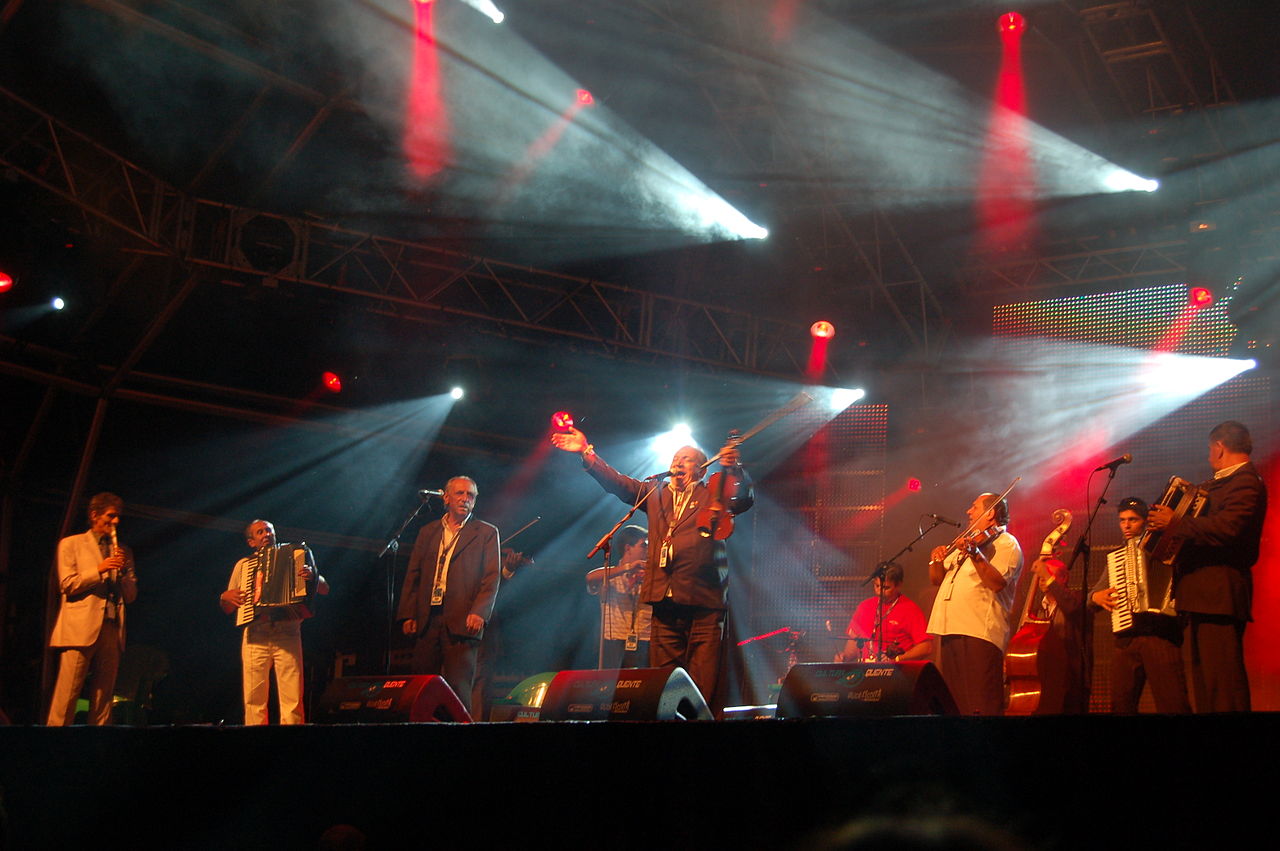 |
Concert archief | ||||||||||||||||||
Stichting Folk Groningen - Concert archief |
|||||||||||||||||||
|
dinsdag 3 december 2024 Riccardo Tesi’s Elastic Trio met Beatriz Aguiar (Italie/ Uruguay) zondag 24 november 2024 Ceolas - Scottish Music Night donderdag 17 oktober 2024 Cerys Hafana zondag 25 augustus 2024 AEVESTADEN woensdag 8 mei 2024 concert door BREABACH zaterdag 28 oktober 2023 Miscellany of Folk dinsdag 22 augustus 2023 Concert FARA donderdag 15 september 2022 AMAK zaterdag 20 augustus 2022 GANGAR vrijdag 17 januari 2020 An Irish Night with Dave Munnely and Shane McGowan woensdag 30 oktober 2019 BANDITALIANA vrijdag 16 augustus 2019 STAMPESTUEN zondag 7 april 2019 DANÚ Ierse trad.op zijn best! dinsdag 5 maart 2019 FAUSTUS zondag 16 december 2018 WÖR speelt swingende tunes met een groove uit de 18e eeuw zaterdag 1 september 2018 Remco Sietsema en band vrijdag 30 maart 2018 RIANTA new sound in Irish trad. zondag 20 augustus 2017 Het Blauwe Uur zondag 20 augustus 2017 Clovers End zondag 20 augustus 2017 RIM dinsdag 21 februari 2017 The Raw Bar Collective vrijdag 3 februari 2017 Lady Maisery woensdag 25 januari 2017 Dave Munnelly (trekharmonica) en Shane McGowan (gitaar, vocals) dinsdag 13 december 2016 Sam Lee and Friends zondag 16 oktober 2016 The Unthanks zaterdag 27 augustus 2016 Nâtah (Bretagne) woensdag 24 augustus 2016 The Reel Thing donderdag 21 april 2016 Söndörgö zaterdag 26 maart 2016 Hamon Martin Quintet donderdag 29 oktober 2015 The Leveret woensdag 30 september 2015 PURE IRISH DROPS woensdag 26 augustus 2015 Mischa MacPherson Trio dinsdag 12 mei 2015 LAU vrijdag 1 mei 2015 The Rambling Boys of Pleasure donderdag 12 februari 2015 Taraf de Haidouk vrijdag 28 november 2014 Banditaliana dinsdag 7 oktober 2014 Pure Irish Drops 2014 woensdag 27 augustus 2014 Bridie Jackson and the Arbour zondag 25 mei 2014 ceili met The Star of the North ceili Band donderdag 3 april 2014 Baraná Orchestra brengt een hommage aan Behsat Uvez donderdag 14 november 2013 Janusz Prusinowski Trio dinsdag 24 september 2013 Pure Irish Drops music from the unknown heart of Ireland vrijdag 26 april 2013 John Spiers and Jon Boden the very best of English folk music! woensdag 20 februari 2013 Bellowhead zaterdag 26 januari 2013 Hot Spoons zaterdag 3 november 2012 - HELAAS ZIJN ZOWEL DE WORKSHOPS ALS HET CONCERT WEGENS OMSTANDIGHEDEN GECANCELLED EN VERSCHOVEN NAAR VOORJAAR 2013 - workshops Hongaarse muziek voor violisten, contra-spelers en dansers zaterdag 3 november 2012 > HELAAS IS HET CONCERT WEGENS OMSTANDIGHEDEN AFGELAST EN WORDT HET VERSCHOVEN NAAR VOORJAAR 2013 < concert en Hongaars danshuis door en met Békés Banda woensdag 10 oktober 2012 Konsonans Retro opwindende brass band uit Odessa met een mix van Moldavische, Oekrainse en Jiddische feestmuziek donderdag 27 september 2012 Pure Irish Drops met kevin Crawford, Damien Mullane en Colin Farell vrijdag 17 augustus 2012 NORDIC Noorderzon zaterdag 9 juni 2012 Anne Niepold Belgische trekharmonica Topper ! zaterdag 14 april 2012 Trad.It! zaterdag 4 februari 2012 Bellowhead zondag 27 november 2011 The Samurai zaterdag 5 november 2011 Stichting Folk Groningen presenteert twee workshops Ierse muziek voor trekharmonicaspelers en fiddlers o.l.v.David Munnelly en Mick Conneely zaterdag 5 november 2011 "Thesinge goes Irish" with David Munelley & Mick Conneely en The Star of the North Ceili Band zaterdag 15 oktober 2011 Pure Irish Drops woensdag 28 september 2011 original Kocani Orkestar zaterdag 2 april 2011 Trad.It! festival for European roots music with a.o. TrioTonico (Italy), Janusz Prusinowski Trio (Poland), Ampouailh (Brittany) and LYY (Sweden) More artists t.b.c. soon dinsdag 15 maart 2011 K CUBE zaterdag 20 november 2010 Willem Vermandere en Johan Verminnen - een avond met Vlaamse intieme liedkunst en subtiele humor - vrijdag 19 november 2010 Eva De Roovere zondag 17 oktober 2010 Pure Irish Drops Ierse muziek op zijn best met Jacky Daly (trekharmonica),Matt Cranitch (fiddle) en Tommy O'Sullivan (gitaar, vocals) zondag 3 oktober 2010 The Unthanks fraaie en sfeervolle folk uit Northumberland vrijdag 20 augustus 2010 GRIFF doedelzakmuziek maar dan anders en, uit België ! zaterdag 24 april 2010 BLIMA zaterdag 24 april 2010 trekharmonica- en samenspelworkshop Asturische muziek met leden van de groep BLIMA zaterdag 10 april 2010 TRAD.IT! festival for European roots music featuring Bellowhead (UK),ZAR(DK),Netnakisum(A), Nordic (S), Blowzabella (UK) donderdag 26 november 2009 Uiscewdr - originele en verrassende folk uit Engeland,Schotland en Ierland - zondag 20 september 2009 Pure Irish Drops music from county Clare vrijdag 28 augustus 2009 Transkapela betoverende muziek uit de Karpaten zaterdag 16 mei 2009 Din Delón italiaanse volksmuziek zaterdag 16 mei 2009 workshops Italiaanse trekharmonica- en draailiermuziek met de Noorditaliaanse groep Din Delon zaterdag 4 april 2009 Trad.It! 2009 met Warsaw Village Band (Polen), Julie Fowlis (Schotland/Ierland), Filippo Gambetta Trio (Italie), Valkyrien Allstars (Noorwegen), La Machine(Frankrijk), Transkapela (Polen), Afenginn (Denemarken), Startijenn (Bretagne) zaterdag 21 maart 2009 Avond van de Vlaamse Liedkunst zaterdag 28 februari 2009 Frisse Wind dinsdag 3 februari 2009 An Irish Night, the new tradition ! vrijdag 12 december 2008 Avond van de Vlaamse Liedkunst zondag 28 september 2008 Pure Irish Drops zaterdag 30 augustus 2008 Dazibao woensdag 27 augustus 2008 Rachel Unthank and the Winterset zaterdag 24 mei 2008 concert door LANG LINKEN zaterdag 24 mei 2008 workshop met Carl Erik Lundgaard en Lang Linken zaterdag 12 april 2008 Trad.It! met Susana Seivane & band (Galicie), Rachel Unthank & The Winterset (Engeland), Dazibao (Belgie), Ulman (Duitsland), Hotel Palindrone (Oostenrijk),Calicanto (Italie), Tsuumi Sound System (Finland), Mairtin O'Connor Trio (Ierland) vrijdag 11 april 2008 Rachel Unthank & The Winterset dinsdag 29 januari 2008 Dan zondag 6 januari 2008 Altan maandag 29 oktober 2007 Riccardo Tesi en Banditaliana zondag 7 oktober 2007 Pure Irish Drops music from the South of Ulster zaterdag 25 augustus 2007 ULMAN zaterdag 14 april 2007 Trad.It! met Kepa Junkera Sextet (Baskenland), Suden Aika (Finland), Dites34 (Frankrijk),Earth Wheel Sky Band (Servie),The Anna Massie Band(Schotland), Ampron Prunni (Finland), Ilgi (Letland) en Cochon Bleu (Nederland) zondag 10 december 2006 Malinky zondag 22 oktober 2006 "Airs and Graces" van traditonal tot work of art in de Engelse koorzang en poezie, mmv.The Christminster Singers en Harry Niehof zaterdag 30 september 2006 Pure Irish Drops donderdag 24 augustus 2006 GOZE (gezellig onderuit zonder elektriek) zaterdag 8 april 2006 TRAD.IT! festival voor handmade music met Olla Vogala (B), At First Light (Irl), Baraban (It), Teada (Irl), Sväng (Fin), Piter Wilkens (Frl), Lo Cor de la Plana (Occ), Hotel Palindrone (Oostenr), Di Grine Kuzine (Dtsl), Markku Lepisto Band (Fin) zondag 13 november 2005 DINDELON zaterdag 12 november 2005 workshops Italiaanse muziek en zang met Dindelon zondag 16 oktober 2005 DAZIBAO maandag 3 oktober 2005 workshops traditionele Ierse muziek met Kathleen Loughnane, Cormac Cannon en Martin Hughes zondag 2 oktober 2005 Pure Irish Drops vrijdag 26 augustus 2005 Minuit Guibolles donderdag 25 augustus 2005 MINUIT GUIBOLLES vrijdag 19 augustus 2005 Polkaholix zaterdag 16 april 2005 TRAD.IT!met o.a. Värttinä,Danu,Groupa,Camaxe, Banditaliana,Polkaholix, Lasairfhiona Ni Chonaola, Harry Niehof, Motion Trio zondag 3 april 2005 TABERNA MYLAENSIS zondag 6 maart 2005 FAERD zondag 14 november 2004 YGDRASSIL zondag 10 oktober 2004 TéADA zondag 26 september 2004 PURE IRISH DROPS zaterdag 21 augustus 2004 Le Diabl' dans la Fourche donderdag 19 augustus 2004 TRIO TARDUCCI en MARJOLEIN üVEZ zondag 16 mei 2004 DEUX ACCORDEONS DIRONT zaterdag 13 maart 2004 TRAD.IT! hét festival voor handmade music met o.a. Four Men and a Dog, The Warsaw Village Band, Dr. Faustus, Uiscedwr, Malbrook, Nadara, Le Diabl' dans La Fourche, Jon Halvorsen & Tore Bruvoll zondag 15 februari 2004 FOLKROSA dit concert gaat helaas niet door !!! zondag 16 november 2003 Llan de Cubel keltische muziek uit het Spaanse Asturië maandag 8 september 2003 Pure Irish Drops 2003 presents ' Women of Ireland' met Mary Custy, Mary Staunton and Kathleen Loughnane zaterdag 30 augustus 2003 Tref zaterdag 23 augustus 2003 TRIKIZIO zaterdag 12 april 2003 TRAD. IT ! folkfestival met oa. Liam O'Flynn, John Spiers & Jon Boden, Olla Vogala,Tarducci, Romano Drom, Törf, The Cajun Compagny, Plommon , Faro en de Schal Sick Brass Band zondag 16 maart 2003 Malinky Schots/Iers vijftal met een fris geluid maandag 10 maart 2003 slotconcert MuziekzonderGrenzen 2003 met Riccardo Tesi & Vincenzo Caglioti, Mats Eden & Lars Karlsson, John Spiers & Jon Boden, Conor McCarthy, Bruno Le Tron, Luke Daniels en Jannick Martin van vrijdag 7 maart 2003 tot zondag 9 2003 MuziekZonderGrenzen 2003 , van 7 t/m 9 maart 2003 op Schiermonnikoog. slotconcert op maandag 10 maart in c.c. De Oosterpoort in Groningen !! woensdag 12 februari 2003 CALICO zondag 24 november 2002 Tilinko Ensemble uit Hongarije donderdag 29 augustus 2002 Pure Irish Drops met Joe Burke, Cathal McConnell & Dinny McLaughlin donderdag 22 augustus 2002 Oleg Fateev en ensemble vrijdag 31 mei 2002 Traditonele en moderne Groninger Wereldmuziek door Törf vrijdag 19 april 2002 PLOMMON uit Zweden maandag 18 februari 2002 MUZIEK ZONDER GRENZEN vrijdag 25 januari 2002 WereldLeed maandag 12 november 2001 bijzonder Iers kwartet rond trekharmonica-virtuoos Luke Daniels zaterdag 10 april 1999 Concert door de Schal Sick Brass Band zondag 7 maart 1999 Charivari Trio woensdag 24 februari 1999 MuziekZonderGrenzen Concert door zondag 17 januari 1999 MAHALA GYPSY STAR ENSEMBLE donderdag 26 november 1998 Anam zaterdag 14 november 1998 Desislava Georgieva zaterdag 24 oktober 1998 Rosanna & Zelia zondag 18 oktober 1998 YANKA ENSEMBLE zaterdag 26 september 1998 ALFREDO MARCUCCI en zijn GRAND ORQUESTA TIPICA VERITANGO |
|
||||||||||||||||||
